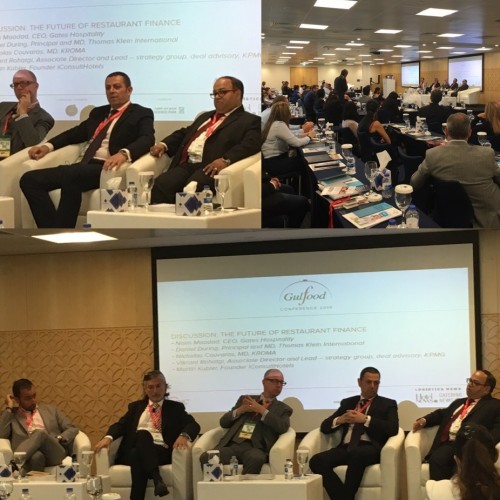At the Gulfood Conference in Dubai, experts at the F&B Business Forum discussed new opportunities for restaurants as the UAE market reaches saturation point.
Naim Maadad, CEO, Gates Hospitality; Daniel During, principal and MD, Thomas Klein International; Nicholas Couvaras, MD, Kroma, Vikrant Rohatgi, associate director and lead – strategy group, deal advisory, KPMG; and Martin Kubler founder iConsulthotels came together for The Future of Restaurant Finance discussion.

While lifestyle expectations, changing consumer demographics, and specialised offerings were cited as opportunities by the panel, all-day dining and buffet restaurants were said to be on the decline.
Maadad of Gates Hospitality said that an F&B opportunity for Dubai is the unique lifestyle the emirate offers residents: “Unlike many other parts of the world, Dubai residents dine out about four times a week.
“Secondly we live in a lifestyle environment that actually facilitates that – most parents work and have a certain expectation of their lifestyle in Dubai.”
The high percentage of expats living in Dubai, and their diversity in terms of ethnicity is another opportunity for the emirate, said Rohatgi of KMPG.
“Almost 90% of the population are expats coming from over 100 nationalities so that creates an opportunity for various cuisines to co-exist in this market and still have enough demand.
“And there are specific pockets which are underpenetrated so that creates an opportunity for certain players to look at those cuisines,” Rohatgi commented.
Kubler of iConsulthotels added that shifting expat age and salary demographics has also opened up opportunities for restaurants in the space between fine-dining and fast-food.
“Over the last 5 years we’ve seen an emergence of restaurants [offering dinner at] AED 100 – 150 per head and that comes with a new generation coming in,” Kubler said.
“Twenty years ago the average expat was 40 – 45 years old; now, the average expat is much younger – we have a lot of people in their 20s and they can’t afford to go to Zuma but they don’t want fast food either.
“If the demographic changes, the opportunity keeps moving and if you have people from different backgrounds, different age groups and different salary levels you have different opportunities to cater for them.”
Outlets that specialise in one cuisine are also underserved in the region, according to Kroma’s Couvaras, who argues that consumers no longer want generic F&B.
“I think there’s a huge trend from consumers that they want to see specialisation – they’d rather go to a place that’s got great pizzas or great burgers rather than a jack of all trades” he commented.
During of Thomas Klein added to this by saying that there is no opportunity any more for all-day dining or buffet restaurants as growing supply increases consumer expectation.
“It doesn’t matter what it’s called, it’s an all-day dining, it has no identity; you can call it what you want but it will always be an all-day dining. In the future of in-hotel F&B it’s highly questionable – guests change. Do we want a restaurant that tries to do everything?” he said.
Maadad concluded that while hotels have a need for breakfast outlets, ultimately guests are looking for “value, variety and a place to belong”.
The Gulfood Conference, produced by BNC Publishing, runs from 21 – 23 February, with Day 2 and Day 3 taking place at Conrad Dubai on Sheikh Zayed Road.
On Day 3, February 23, discussion on Global Food Security and Public Health and the Food Industry will take place. The full agenda can be viewed by clicking on this link.


































































